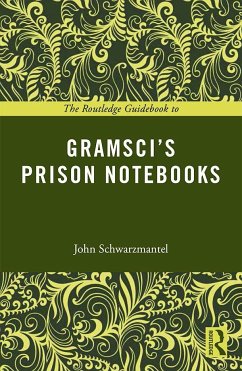Gramsci's Prison Notebooks are one of the most important and original sources of modern political philosophy but the Prison Notebooks present great difficulties to the reader. Not originally intended for publication, their fragmentary character and their often cryptic language can mystify readers, leading to misinterpretation of the text. The Routledge Guidebook to Gramsci's Prison Notebooks provides readers with the historical background, textual analysis and other relevant information needed for a greater understanding and appreciation of this classic text. This guidebook:
Explains the arguments presented by Gramsci in a clear and straightforward way, analysing the key concepts of the notebooks.Situates Gramsci's ideas in the context of his own time, and in the history of political thought demonstrating the innovation and originality of the Prison Notebooks. Provides critique and analysis of Gramsci's conceptualisation of politics and history (and culture in general), with reference to contemporary (i.e. present-day) examples where relevant. Examines the relevance of Gramsci in the modern world and discusses why his ideas have such resonance in academic discourse
Featuring historical and political examples to illustrate Gramsci's arguments, along with suggestions for further reading, this is an invaluable guide for anyone who wants to engage more fully with The Prison Notebooks
Explains the arguments presented by Gramsci in a clear and straightforward way, analysing the key concepts of the notebooks.Situates Gramsci's ideas in the context of his own time, and in the history of political thought demonstrating the innovation and originality of the Prison Notebooks. Provides critique and analysis of Gramsci's conceptualisation of politics and history (and culture in general), with reference to contemporary (i.e. present-day) examples where relevant. Examines the relevance of Gramsci in the modern world and discusses why his ideas have such resonance in academic discourse
Featuring historical and political examples to illustrate Gramsci's arguments, along with suggestions for further reading, this is an invaluable guide for anyone who wants to engage more fully with The Prison Notebooks
"Schwarzmantel (Univ. of Leeds, UK) explains more fully the place of the 1971 Selections in the notebooks as a whole, relates them to the historical and political context in which they were written, and examines their influence on later thinkers and political developments. Schwarzmantel's explanation of Gramsci's main concepts and arguments, their relation to the controversies within the revolutionary movement of his day, and the ways in which they have been carried forward to the present are all excellent. Some critiques (e.g., that today's parties cannot play the role of the modern prince seem shallow), but overall, the book will be of great use to anyone interested in Gramsci and his thought." - J. C. Berg, CHOICE, Feb 2016
"This Guidebook will definitely become a most useful resource for Gramscian studies. John Schwarzmantel has achieved his aims, as formulated in his book's Preface, as the Guidebook 'introduces readers to Gramsci's highly original and exciting reflections on politics, history, philosophy and culture, which can help us make sense of our present epoch, different though it is in crucial aspects from the era in which Gramsci wrote his notes in the cell of a fascist prison'." Marx & Philosophy, Jan 2016
"This Guidebook will definitely become a most useful resource for Gramscian studies. John Schwarzmantel has achieved his aims, as formulated in his book's Preface, as the Guidebook 'introduces readers to Gramsci's highly original and exciting reflections on politics, history, philosophy and culture, which can help us make sense of our present epoch, different though it is in crucial aspects from the era in which Gramsci wrote his notes in the cell of a fascist prison'." Marx & Philosophy, Jan 2016








